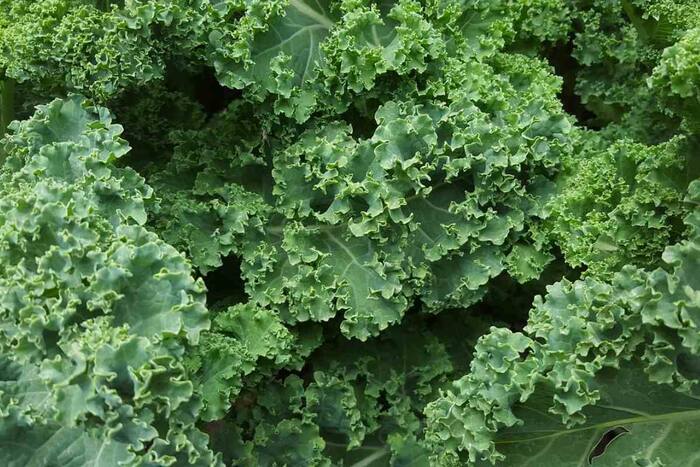
By clicking “Accept All Cookies”, you agree to the storing of cookies on your device to enhance site navigation, analyze site usage, and assist in our marketing efforts Cookies Policy.

Kale is a nutrient-rich vegetable packed with vitamins A, C, and K, which support vision, immunity, and bone health. It is loaded with antioxidants like quercetin and kaempferol, reducing oxidative stress and the risk of chronic diseases. The high potassium and fiber content contribute to heart health by lowering blood pressure and cholesterol. Kale’s lutein and zeaxanthin promote eye health, while vitamin C boosts the immune system. It also has anti-inflammatory properties, aids in detoxification, and supports weight management due to its fiber and low-calorie content.
1. Rich in Nutrients
Kale is loaded with essential vitamins and minerals. A single cup provides high amounts of vitamin A (in the form of beta-carotene), vitamin C, and vitamin K. These vitamins support vision, immune function, and bone health. Additionally, kale contains smaller amounts of calcium, iron, magnesium, and potassium, which contribute to muscle, nerve, and heart function.
2. Powerful Antioxidant Properties
Kale is rich in antioxidants like quercetin and kaempferol. These antioxidants help neutralize free radicals in the body, reducing oxidative stress and lowering the risk of chronic diseases such as cancer, heart disease, and neurodegenerative disorders.
3. Supports Heart Health
The high potassium content in kale can help maintain healthy blood pressure by balancing out the effects of sodium. Its fiber content also aids in reducing cholesterol levels, especially LDL (“bad”) cholesterol, which contributes to heart disease. Kale also contains omega-3 fatty acids (alpha-linolenic acid), which promote cardiovascular health.
4. Excellent Source of Vitamin K
Kale is one of the best plant-based sources of vitamin K, a nutrient crucial for blood clotting and bone health. It aids in the synthesis of proteins involved in blood clotting and strengthens bones by improving calcium absorption.
5. Supports Bone Health
In addition to vitamin K, kale provides calcium and magnesium, essential minerals for maintaining strong bones. Regular consumption of kale can help prevent osteoporosis and other bone-related conditions.
6. Promotes Eye Health
Kale is rich in lutein and zeaxanthin, antioxidants known to protect the eyes from macular degeneration and cataracts. These carotenoids filter harmful high-energy blue light and reduce oxidative damage to the eyes. The vitamin A (beta-carotene) in kale also supports healthy vision.
7. Boosts Immune Function
The high levels of vitamin C in kale enhance the immune system by stimulating the production of white blood cells, which protect the body against infections. Vitamin C also acts as an antioxidant, shielding the cells from damage.
8. Anti-Inflammatory Properties
Kale’s antioxidants and omega-3 fatty acids help reduce inflammation in the body, which can alleviate symptoms of chronic inflammatory conditions like arthritis, asthma, and heart disease. It also contains flavonoids that further reduce inflammatory responses.
9. Aids in Detoxification
Kale contains sulfur compounds and fiber, which assist in detoxifying the liver by promoting the elimination of toxins and waste products from the body. Its chlorophyll content also helps bind to and expel heavy metals from the bloodstream, supporting overall detoxification.
10. Weight Loss and Digestive Health
Kale is low in calories and high in fiber, making it ideal for weight management. Its fiber content promotes a feeling of fullness, reducing overeating, and also aids in digestion by regulating bowel movements and preventing constipation. Additionally, the fiber in kale helps feed beneficial gut bacteria, improving gut health.
Kale offers a multitude of health benefits, from promoting heart and bone health to boosting immunity and aiding digestion. It is an extremely versatile vegetable that can be consumed raw in salads, added to smoothies, or cooked into a variety of dishes, making it a valuable addition to a healthy diet.
For breaking news and live news updates, like us on Facebook or follow us on Twitter and Instagram. Read more on Latest Dishes News on India.com.